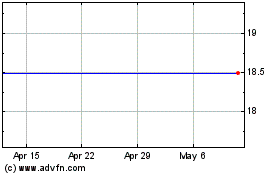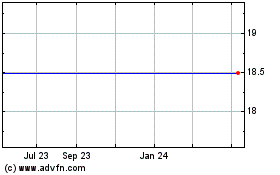Coach to Buy Kate Spade for $2.4 Billion -- 2nd Update
May 08 2017 - 11:44AM
Dow Jones News
By Suzanne Kapner and Joshua Jamerson
Coach Inc. agreed to acquire rival Kate Spade & Co. for $2.4
billion, as the purse maker seeks to tap younger consumers when
growth in the handbag market has stalled.
Sales of handbags have slowed as women have traded down to
smaller, less expensive bags and aggressive discounting both in
stores and online has pressured profits. The proposed merger would
combine two big U.S. players, and create a company with $5.9
billion in annual sales and 1,300 retail stores and outlets around
the world.
On Monday, Coach Chief Executive Victor Luis said there is
little overlap between customers of the two brands, especially
since Coach has tried to move upscale in recent years. The
attraction of Kate Spade was its appeal to younger shoppers, Mr.
Luis said, adding that only 10% of consumers say they buy both
brands.
"Kate Spade has the highest penetration among millennials within
our competitive set," Mr. Luis said in an interview. "Millennials
offer a market that is substantial in terms of size and allows us
to recruit younger customers."
The handbag market has slowed to about 2% growth from as much as
15% growth six years ago, said Craig Johnson, an analyst at
Customer Growth Partners. Coach has responded by targeting a
slightly older and wealthier client with higher-priced bags, which
has created a gap for younger 20-something shopper that it can fill
with Kate Spade, Mr. Johnson said.
Mr. Luis said he still had confidence the handbag and leather
goods space is better positioned than other corners of retail.
"Consumers continue to shift dollars away from apparel to handbags,
accessories and footwear," he said.
Coach will pay Kate Spade shareholders $18.50 a share in cash.
That represents a 28% premium to Kate's closing price as of Dec.
27, the last trading day before a Wall Street Journal report that
Kate was exploring a sale of the company after coming under
pressure from an activist shareholder. The company confirmed it was
reviewing such options in February.
Both companies, based in New York, have battled a retail
environment that has been challenging, especially for designers
with significant exposure to department stores, where traffic has
declined. U.S.-based luxury brands are also negatively affected by
a strong U.S. dollar.
Coach had revenue of $4.5 billion in the fiscal year ended July
2016, down from more than $5 billion a few years ago. Kate Spade,
which shed several apparel brands to focus on its handbag business,
had revenue of $1.4 billion in the year ended Dec. 31.
Sales at Coach have started to grow again in recent quarters as
it pulled back from department stores, closed a third of its
full-priced stores in North America and reduced promotions. The
company said it plans to reduce online flash sales as well as
distribution in off price chains like T.J. Maxx for Kate Spade
after the deal closes, which is expected to occur in the third
quarter.
Mr. Luis said 35% of Coach stores overlap with Kate Spade stores
in North America but he didn't plan widespread closures following
the combination. However, analysts said there were still too many
stores given the sluggish mall traffic.
"Anybody who's been to Woodbury Common outlets and seen two
Coach (women and men) and two Kate Spade stores (accessories and
apparel) all within 30 yards of each other doesn't need a rocket
science degree to know that the combined company doesn't need all
that space," Mr. Johnson said.
Coach does plan to expand Kate Spade outside the U.S.,
particularly in China and Europe, where the brand has a few dozen
stores and outlets. And Mr. Luis said there is an opportunity to
buy out some joint venture partners or distributors in those
regions.
Kate Spade shares rose 8% to $18.35 in Monday morning trading,
while Coach shares gained 6% to $45.30.
Coach has been on the hunt for acquisitions as Mr. Luis seeks to
build a collection of brands and respond to the rapid rise of
Michael Kors Holdings Ltd. Coach approached Burberry Group PLC
about a takeover last year but was rebuffed. It acquired shoe maker
Stuart Weitzman Holdings LLC last year. On Monday, Mr. Luis said
Coach might still seek small deals but the Kate Spade transaction
would leave little room for another large transaction in the near
term.
The brands will be kept separate and there are no plans to cross
sell products at each other's stores, executives said. Mr. Luis
said his intention was to retain key Kate Spade employees including
Craig Leavitt, who will continue to serve as chief executive of the
Kate Spade brand.
The transaction is subject to the tender of a majority of the
outstanding Kate Spade shares as well as regulatory approvals.
Kate Spade can terminate the transaction if the company is
offered a superior proposal from another suitor, and Coach can
terminate the deal if Kate Spade's board no longer supports it.
Either circumstance would require Kate Spade to pay Coach an $83.3
million termination fee.
Either company can call off the deal if it isn't complete by
Feb. 7.
Write to Suzanne Kapner at Suzanne.Kapner@wsj.com and Joshua
Jamerson at joshua.jamerson@wsj.com
(END) Dow Jones Newswires
May 08, 2017 11:29 ET (15:29 GMT)
Copyright (c) 2017 Dow Jones & Company, Inc.
Kate Spade & Company (NYSE:KATE)
Historical Stock Chart
From Jun 2024 to Jul 2024

Kate Spade & Company (NYSE:KATE)
Historical Stock Chart
From Jul 2023 to Jul 2024
